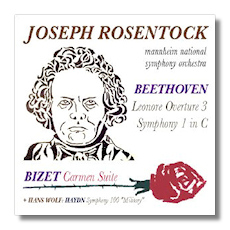
The Internet's Premier Classical Music Source
Related Links
-
Beethoven Reviews
Bizet Reviews
Haydn Reviews - Latest Reviews
- More Reviews
-
By Composer
-
Collections
DVD & Blu-ray
Books
Concert Reviews
Articles/Interviews
Software
Audio
Search Amazon
Recommended Links
Site News
 CD Review
CD Review
ReDiscoveries

- Ludwig van Beethoven:
- Leonore Overture #3
- Symphony #1 in C
- Georges Bizet: Carmen Suite
- Franz Joseph Haydn: Symphony #100 "Military" *
Mannheim National Symphony Orchestra/Joseph Rosenstock
* Mannheim National Symphony Orchestra/Dr. Hans Wolf
ReDiscovery RD126 74:49
The city of Mannheim is located in the southwestern region of Germany and is home to over 300,000 citizens. In 1607, it was officially designated as a city by the Elector Frederick IV, so as I write this review, Mannheim is celebrating its 400th birthday.
Mannheim is famous for its Daimler automobile plant, its Wasserturm (an old-fashioned water tower), and the so-called "Mannheim School" of composers, active during the 1700s, including Johann and Carl Stamitz, and Christian Cannabich. Apparently the court of Elector Carl Philipp boasted an impressive orchestra. Today, Mannheim doesn't have a large international presence as an "orchestra city," which makes this new ReDiscovery CD a happy surprise. These recordings, originally released on the Livingston label as reel-to-reel tapes, might make some collectors suspicious that the named ensemble is a pseudonym. Apparently, though, there really was a Mannheim National Symphony Orchestra in the 1950s – which is when I assume these recordings first saw light of day. (I don't know if the Orchestra persists today under this name, or a different one. A quick web search turned up nothing.)
Whenever I see a recording in which the conductor's name is preceded by "Dr.," I also suspect that the name is pseudonym. Once again, however, Dr. Hans Wolf was a real person, and he died as recently as 2005. He served as Livingston's "musical director," and ReDiscovery's brief notes also inform us that he conducted at the Seattle Opera very late in his life. His performance of Haydn's "Military" Symphony is delightful, steering a middle course between Romantic excess and the severity one sometimes gets with today's authentic performance practices. One doesn't have to make excuses for this "Military"'s presence!
Joseph Rosenstock (1895-1985) was similarly long-lived. ReDiscovery tells us that he was born in Kraków, studied in Vienna, and worked in opera houses in Darmstadt, Stuttgart, and Mannheim until he was forced out by the Nazis. From there, he went to Japan (!), and then, after the war, to New York City, where he became associated with both the New York City Opera and the Metropolitan Opera. I wonder what it was like for Rosenstock to return to Mannheim in the 1950s?
Rosenstock doesn't elicit such polished playing from the Orchestra – not compared to Wolf, anyway. The violins can sound thin and scratchy, particularly in Beethoven's Leonore Overture #3. Still, Rosenstock and the Orchestra build up a good head of steam in the overture, and so Beethoven is well served. The performance of the symphony, while not at all objectionable, is not unusual or remarkable in any way. (It seems that this was the first stereophonic recording of the work.) Collectors of phonographic arcana – and I guess I have to include myself among them – will appreciate it regardless.
There are lots of different ideas as to what constitutes a suite from Carmen. One can understand the confusion, because in the 1950s, it was not unusual to insert the "Danse Bohème" from Bizet's Fair Maid of Perth into the short final act of Carmen. Indeed, that number closes this Carmen Suite, even though Carmen itself has a perfectly good "Danse Bohème." (Rosenstock teases us with the opening of the one from Carmen, and then glides into the one from Fair Maid of Perth.) The "Farandole" from L'Arlésienne also makes an appearance. Well, whatever. The playing is colorful and lively, although the orchestra clearly is not of the first rank. Oddly, the inlay card indicates that the composer of Carmen is "Charles" Bizet. (Not to be confused with "Georges" Gounod, I guess!)
An added incentive toward purchasing this CD-R is the sound. ReDiscovery had access to the reel tape masters for all of these recordings, and the wide-ranging stereo sound hardly shows its age. In fact, it compares favorably to many a more recent recording, even if the channel separation is perhaps a bit exaggerated. David Gideon's digital remastering is excellent.
ReDiscovery CD-Rs are available from www.rediscovery.us for $15, which includes shipping and handling. All things considered, this is an enjoyable reissue.
Copyright © 2007, Raymond Tuttle












